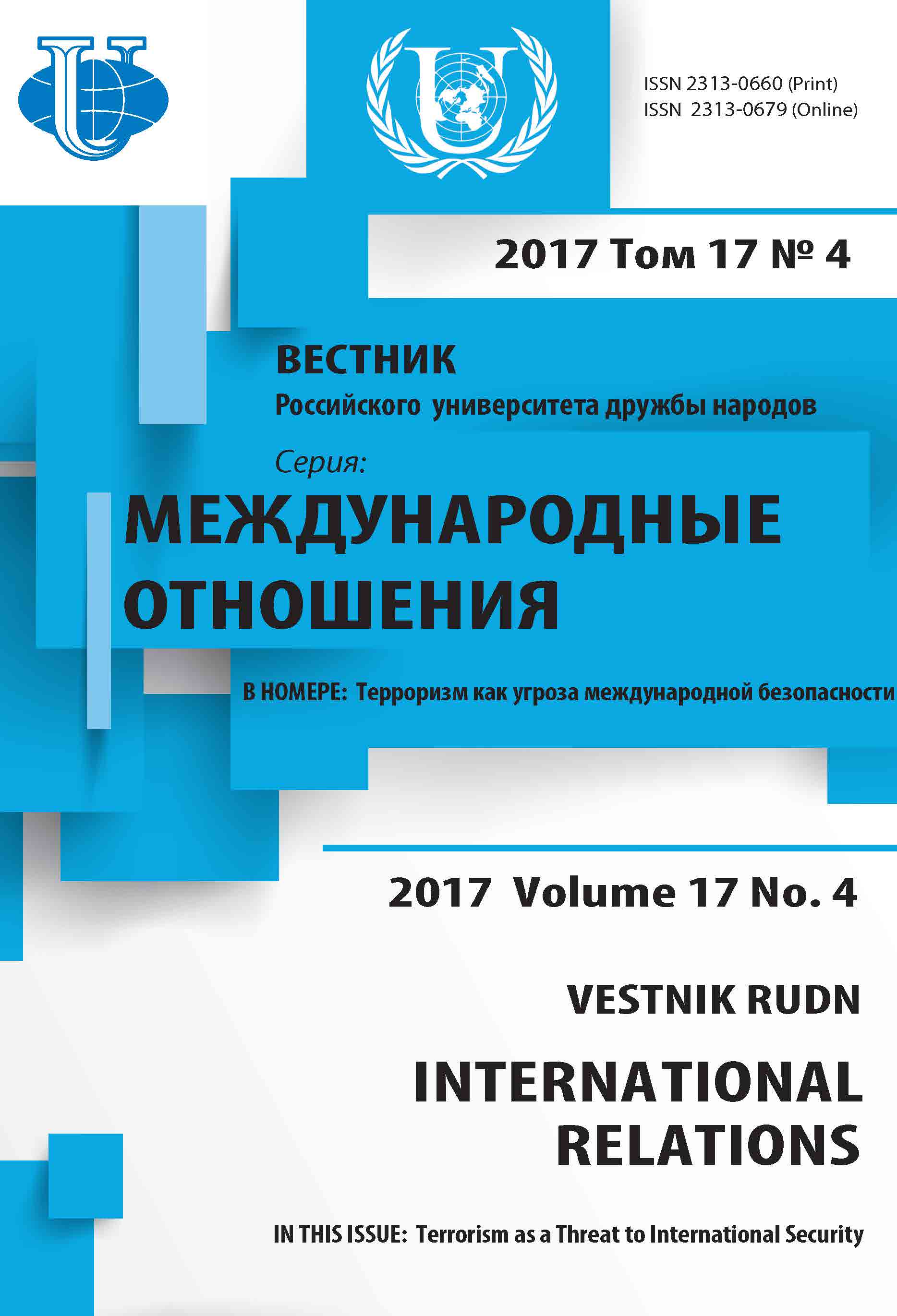NETWORK CHARACTER OF INTERNATIONAL TERRORISM AND THE POSSIBILITY OF THE CONSOLIDATION OF THE RUSSIAN SOCIETY
- Authors: Abramov AV1, Fedorchenko SN1, Kurylev KP2
-
Affiliations:
- Moscow State Regional University
- Peoples’ Friendship University of Russia (RUDN University)
- Issue: Vol 17, No 4 (2017): Terrorism as a threat to international security
- Pages: 738-748
- Section: THEMATIC DOSSIER
- URL: https://journals.rudn.ru/international-relations/article/view/17532
- DOI: https://doi.org/10.22363/2313-0660-2017-17-4-738-748
Cite item
Full Text
Abstract
The purpose of this article is to analyze the network of the mechanism of reproduction of international terrorism - the phenomenon of post-truth, strongly modifies the previous interpretation of the political, ethnic, religious, cultural and social, leading to the disappearance of the former meaning when it is important that people are truthful news report or not, and his active experience, discussion. Used as a methodology content analysis of online communities has confirmed the working hypothesis that, despite absenteeism and the atomization of society in modern countries, manifested by the rapid politicization of the communities the social networks of the Internet because of the undermining of public confidence in traditional political institutions - parties and Parliament. Terrorist recruiters use this trend to their advantage, warming the emotional state of the participants of social networks and sharpening their grievances and contradictions on various grounds. According to the authors, the terrorist propaganda about brotherhood and religious cosmopolitan society the modern state can be countered only by the ideology of patriotism. With the characteristic feature of patriotism should be its bearing on national sovereignty and a functioning state. However, the authors are analyzing methodological developments in the problem of Patriotic education in modern Russia, note that most of the proposed techniques do not consider the development of a network society and borrowed from the Soviet range: lectures, discussions, class hours, competitions of the show and songs, military-Patriotic fees, etc. The work concludes that the state is not paying attention to the mechanisms of Assembly of new political identities through social networks and are not involved in elementary political education through Internet communication, will be eliminated from the virtual environment and will not be able to build an effective protection of technologies of coups in the form of “color revolutions”.
About the authors
A V Abramov
Moscow State Regional University
Author for correspondence.
Email: abram-off@mail.ru
Abramov Andrey Vyacheslavovich - PhD in Political Sciences, Associate Professor, Associate Professor of the Department of Political Science and Law, Moscow State Regional University
S N Fedorchenko
Moscow State Regional University
Email: s.n.fedorchenko@mail.ru
Fedorchenko Sergey Nikolaevich - PhD in Political Sciences, Associate Professor, Associate Professor of the Department of Political Science and Law, Moscow State Regional University
K P Kurylev
Peoples’ Friendship University of Russia (RUDN University)
Email: kurylev_kp@rudn.university
Kurylev Konstantin Petrovich - Doctor of Historical Sciences, Associate Professor, Associate Professor of the Department of Theory and History of International Relations, Peoples’ Friendship University of Russia (RUDN University)
References
- Abramov, A.V. & Fedorchenko, S.N. (2016). The politicization of contemporary Russian society and the patriotism of the citizens: a content analysis of social networks. Bulletin of Omsk University. A series of “Historical science”, 1 (9), 115—120. (In Russ.).
- Bauman, Z. (2006). Liquid Fear. Cambridge: Polity Press.
- Beer, D. (2009). Power though the algorithm? Participatory web cultures and the technological unconscious. New Media & Society, 11 (6), 985—1002. doi: 10.1177/1461444809336551.
- Chikunov, V.D. (2014). System of combating terrorism in the Russian Federation. Power, 8, 190—192. (In Russ.).
- Chugrov, S.V. (2017). Post-truth: transformation of political reality or self-destruction of liberal democracy? Polis. Political studies, 2, 42—59. (In Russ.).
- Coretty, L. & Pica, D. (2015). The Rise and Fall of Collective Identity in Networked Movements: Communication Protocols, and Anti-Berlusconi Protest. Information, Communication & Society, 18 (8), 951—967.
- Degterev, D.A. & Belyakova, E.A. (2013). Modern technologies of the analysis of international conflicts. Obozrevatel-Observer, 1 (276), 80—87. (In Russ.).
- Dutkiewicz, P. & Kazarinova, D.B. (2017). End of the era of globalization: causes and effects. RUDN Journal of Political Science. 19 (1), 7—14. (In Russ.).
- Grachev, S.I., Gasimov, O.A. & Popov, A.S. (2013). The Ideology as a defining component of terrorist activity and counter-terrorism policy. Bulletin Kazan law Institute of MIA Russia, 1 (12), 45—49. (In Russ.).
- Ignatieff, M. (2004). The lesser evil: political ethics in an age of terror. Princeton (N.J.); Oxford: Princeton univ. press, XII, 124—125.
- Kargina, I.G. (2013). Key trends in the study of contemporary manifestations of religiosity. Sotsis. 6, 108—115. (In Russ.).
- Kurylev, K.P., Nikulin, M.A. & Goncharova, A.A. (2017). “Soft power” cultural diplomacy of the Islamic Republic of Iran. Bulletin of Moscow state regional University. Series: History and Political science, 2, 46—55. doi: 10.18384/2310-676X-2017-2-46-55 (In Russ.).
- Segaev, I.S. (2015). ISIL and Russia’s national security: assessing risks and threats. Bulletin of Moscow state regional University (E-journal), 1. URL: http://evestnik-mgou.ru/en/Articles/Doc/622 (accessed: 13.05.2017).











